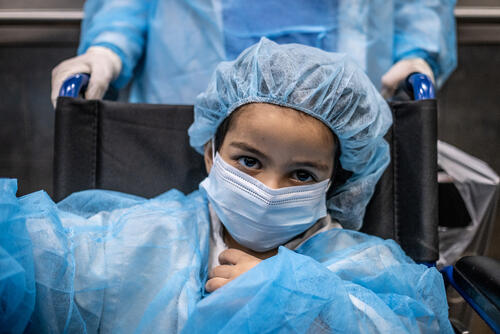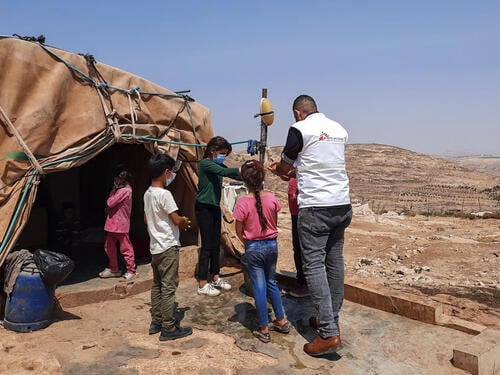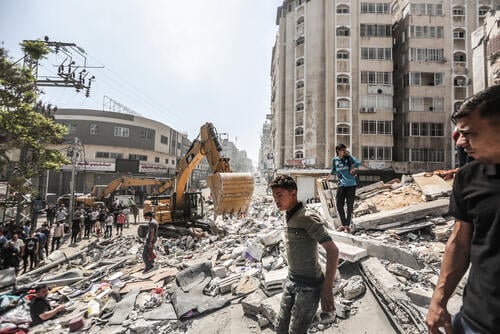- Palestine, where just two per cent of people have been vaccinated, urgently needs COVID-19 vaccines to protect frontline staff and vulnerable people.
- It comes as the number of people hospitalised with the new coronavirus has exploded, leaving hospitals struggling to cope.
- MSF is urging both Israeli and Palestinian authorities to step up efforts to curb the spread of the disease, including through vaccination.
Since February, another heavy wave of COVID-19 has swept through the West Bank, Palestine. Over 20,000 patients are currently being treated for the new coronavirus, adding further pressure to an already fragile healthcare system, and leaving medical staff struggling to provide adequate care. Both the Israeli government and the Palestinian Authorities must immediately significantly increase efforts to slow the spread of COVID-19 and its new variants. Stronger efforts in COVID-19 prevention and case management must be undertaken as well.
“The number of positive cases is at its highest level since the beginning of the pandemic,” says Dr Juan Pablo Nahuel Sanchez, MSF intensive care unit doctor. “We currently have 71 people hospitalised in Dura hospital in Hebron – the main hospital and the only COVID-designated facility in the south of the West Bank – and 27 of them are in the intensive care unit.”
“The hospital is operating beyond capacity,” says Dr Nahuel Sanchez. “There is not enough space, beds or staff to help all of our critical patients, and people are dying.”
Hebron has been one of the worst-hit governorates in the West Bank. MSF has been supporting the hospital by training staff and treating patients. Our teams are also raising awareness of COVID-19 among local communities to reduce the spread of the virus, and are providing counselling to patients and their families.
The hospital is operating beyond capacity. There is not enough space, beds or staff to help all of our critical patients, and people are dying.Dr Juan Pablo Nahuel Sanchez, MSF intensive care unit doctor
“The percentage of younger people affected by COVID-19 has increased dramatically,” says Dr Nahuel Sanchez. “One in three patients currently admitted to Dura hospital is aged between 25 and 64, whereas before the majority of patients were over 64.”
Approximately 75 per cent of cases now being sampled in the West Bank are the variant B117, originating in the UK, according to the Palestinian Ministry of Health’s genomic analysis. This variant is thought to be around 50 per cent more transmissible than previous strains. Studies have recently suggested that the variant is 40-60 per cent more likely to result in severe COVID-19, necessitating supplemental oxygen and ventilator support, with an increased risk of death. With COVID-19 variants circulating in the occupied territories, there must be intensified sampling to understand how widely they have spread.
In Nablus, in the north of the West Bank, the situation is equally worrying. The Palestinian Red Crescent Society (PRCS) hospital is working over capacity and is now transforming its respiratory care unit into a ward for COVID-19 patients.
“We are doing our best to save them all,” says Marius Sanciuc, an MSF ICU nurse providing training and medical support to staff at the PRCS hospital. “The biggest challenge is that hospital staff have limited experience in caring for very sick patients or patients with COVID-19.”
Simple procedures such as proning – in which a patient is turned on to their stomach to improve breathing – have been a challenge.
“Try to imagine turning a patient around, from their back onto their abdomen, when they have many IV lines and tubes leading into their chest cavity and abdomen,” says Sanciuc. “It is a difficult task, where you need five people, but it’s not impossible.”
We are very concerned about the delayed and slow vaccination roll out... frontline workers and high-risk groups in Palestine are nowhere near having protection from the disease.Ely Sok, MSF head of mission in Palestine
In Gaza, the number of patients with COVID-19 fell in February, but in mid-March it began to rise again. Gaza’s healthcare system is already crippled by decades of Israeli occupation and a long-running economic blockade. Another wave of COVID-19 is of grave concern to the MSF team working there. As COVID-19 spreads further through the West Bank and Gaza, Palestinians remain unprotected.
“We are very concerned about the delayed and slow vaccination roll out,” says Ely Sok, MSF head of mission in Palestine territories. “On the one hand, in Israel the large availability of vaccine doses is now allowing the government to pursue herd immunity, without any intention to significantly contribute to the improvement of vaccination rates in the Palestinian territories.”
“On the other, it has proven difficult to obtain a clear picture of the availability and delivery strategy of the vaccine doses already received from the Palestinian health authorities,” says Sok. “Meanwhile, frontline workers and high-risk groups in Palestine are nowhere near having protection from the disease.”
As of mid-March, less than two per cent of Palestinians have been vaccinated from COVID-19 in the West Bank and Gaza – an alarmingly small number in light of the third wave of the deadly pandemic.
MSF has been providing medical care in the Palestinian territories since 1989. From the onset of the COVID-19 pandemic we supported the local health system by providing technical advice and hands-on training, and have donated drugs, consumables, personal protective equipment and medical equipment to the main hospitals in Hebron and Nablus, in the West Bank, and in the Gaza Strip. In the West Bank, the MSF team also launched a hotline service to provide remote counselling to support patients and their families, medical personnel and other first responders, and families of detainees affected by the COVID-19 outbreak. In addition, MSF is running COVID-19 health promotion and mental health promotion activities with affected communities.






